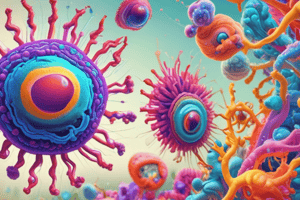Podcast
Questions and Answers
What is a cornerstone of biology?
What is a cornerstone of biology?
- Ecology and behavior interactions
- Genetic makeup of organisms
- Medicine and health advancements
- The concept of evolution driven by genetic variation and natural selection (correct)
What do biologists study to understand the relationships between living organisms and their ancestors?
What do biologists study to understand the relationships between living organisms and their ancestors?
- Pathways of gene expression
- Development of new therapies
- Mechanisms of human disease
- Fossil record and molecular evidence (correct)
What is the discipline that studies the interactions between organisms, populations, and community structure?
What is the discipline that studies the interactions between organisms, populations, and community structure?
- Ecology (correct)
- Genetic recombination
- Survival and cooperation in the wild
- Medicine and health
Which area of biology focuses on the mechanisms of human disease and immune system interactions?
Which area of biology focuses on the mechanisms of human disease and immune system interactions?
What does the vast scope of biology encompass from cells to life on Earth?
What does the vast scope of biology encompass from cells to life on Earth?
Which enables biologists to offer fresh perspectives on the wonders of life?
Which enables biologists to offer fresh perspectives on the wonders of life?
What is the central dogma of molecular biology?
What is the central dogma of molecular biology?
Which field deals with the study of inheritance, variation, and expression of genetic information?
Which field deals with the study of inheritance, variation, and expression of genetic information?
What serves as the fundamental unit of life in biology?
What serves as the fundamental unit of life in biology?
What does biology study in terms of the complex interactions between organisms and their environments?
What does biology study in terms of the complex interactions between organisms and their environments?
What did biologists once herald upon discovering DNA's double helix structure?
What did biologists once herald upon discovering DNA's double helix structure?
What does the field of biology aim to study?
What does the field of biology aim to study?
Flashcards are hidden until you start studying
Study Notes
Exploring Science: A Glimpse into Biology
As we delve into the vast realm of science, one of its most captivating branches is biology: the study of living organisms. This field, spanning from microscopic single-celled creatures to the complexities of human beings and life's origins, continues to reveal the intricate and interwoven web of life.
Biological Systems and Organization
At the heart of biology lies the understanding of how life is organized into systems and structures. These biological systems include cellular organization, metabolic processes, genetic information, and the complex interactions between organisms in their environments. Biologists dissect these systems, teasing apart the molecular machine parts that underlie life.
Consider the cell, at once a simple and intricate entity that serves as the fundamental unit of life. Biologists study cells' structures, reactions, and interactions, learning how they function individually and cooperate within organisms. The central dogma of molecular biology, consisting of the interplay between DNA, RNA, and protein synthesis, provides the foundation for understanding life at its most basic level.
Genetics and Evolution
The field of genetics, once heralded by the discovery of DNA's double helix structure, deals with the inheritance, variation, and expression of genetic information in living organisms. Biologists examine the genetic makeup of organisms, the mechanisms of genetic recombination and mutation that drive evolution, and the pathways of gene expression.
The concept of evolution, driven by genetic variation and natural selection, is a cornerstone of biology. Biologists study the history of life on Earth, the processes that shape species, and the mechanisms that drive adaptation and speciation. The fossil record and molecular evidence support the idea that life has evolved over billions of years, shaping our understanding of the relationships between living organisms and their ancestors.
Ecology and Behavior
Nature is a complex tapestry of interactions between organisms, and ecology is the discipline that studies these relationships. Biologists examine the relationships between living organisms, the dynamics of their populations, and the interactions between species that drive community structure and ecosystem function.
The study of behavior, encompassing the activities of individual organisms, provides insights into how living organisms interact with their environments and with one another. Biologists study the intricate dances of animals, the chemical communications of plants, and the stories of survival and cooperation that unfold in the wild.
Medicine and Health
Biology's interdisciplinary nature offers avenues for exploring the relationships between living organisms and disease. In the field of medicine, biologists examine the mechanisms of human disease, the causes of illness, and the development of new therapies and treatments.
From the molecular underpinnings of genetic diseases to the complex interactions of the immune system, biology offers rich insights into human health and disease. Biologists study the basic mechanisms of life, the causes and consequences of genetic variation, and the complexities of human health and disease.
Conclusion
Biology's vast scope encompasses a diverse array of subfields, from the intricate molecular machinery of cells to the grand tapestry of life on Earth. Through their diligent and curious exploration of life's mysteries, biologists unearth new knowledge and insights, offering fresh perspectives on the wonders of life. From the cellular machinery of life to the complexities of human health and disease, biologists continue to illuminate the depths of our understanding of life.
Studying That Suits You
Use AI to generate personalized quizzes and flashcards to suit your learning preferences.



